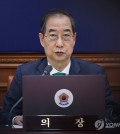- California Assembly OKs highest minimum wage in nation
- S. Korea unveils first graphic cigarette warnings
- US joins with South Korea, Japan in bid to deter North Korea
- LPGA golfer Chun In-gee finally back in action
- S. Korea won’t be top seed in final World Cup qualification round
- US men’s soccer misses 2nd straight Olympics
- US back on track in qualifying with 4-0 win over Guatemala
- High-intensity workout injuries spawn cottage industry
- CDC expands range of Zika mosquitoes into parts of Northeast
- Who knew? ‘The Walking Dead’ is helping families connect
N. Korea appears to be preparing for explosions on roads connected to S. Korea: JCS
North Korea appears to be preparing to carry out explosions at roads connected to South Korea as early as Monday, the South’s military said, just days after Pyongyang vowed to cut off all inter-Korean roads and railways.
On Wednesday, the North’s Korean People’s Army (KPA) announced the measure that will “completely separate” North Korea’s territory from that of South Korea and said it sent a telephone message to the U.S. military in the South to “prevent any misjudgment and accidental conflict over the fortification project.”
“Following an announcement by the KPA on Oct. 9, the North Korean military has been carrying out activities assumed to be linked to explosions on the roads along the Gyeongui and Donghae lines,” the Joint Chiefs of Staff (JCS) said.
JCS spokesperson Col. Lee Sung-jun said at a regular briefing that the military has detected the North installing screens along the roads to make preparations for the explosions.
“It is possible for (North Korea’s explosions) to take place as early as today,” he said.
The JCS said it is closely monitoring such activities that are taking place north of the Military Demarcation Line and seeking safety measures for troops and South Korean people.
The Koreas are connected by roads and railways along the Gyeongui line, which connects the South’s western border city of Paju to the North’s Kaesong, and the Donghae line along the east coast.
The latest move came as North Korea has been ramping up inter-Korean tensions and wiping out traces of unification after its leader Kim Jong-un defined the Koreas as “two hostile states” last year and has taken steps to eliminate the routes once seen as symbols of inter-Korean exchange and cooperation.
The North has since dismantled street lamps and installed mines along its side of the Gyeongui and Donghae roads as well as deployed troops to build suspected anti-tank barriers and reinforce barbed wire within the North’s side of the Demilitarized Zone separating the two Koreas.
On Friday, North Korea claimed that the South had sent unmanned drones over Pyongyang three times this month. Kim Yo-jong, the influential sister of the North Korean leader, warned of a “horrible disaster” if South Korean drones are flown again over the North’s capital the following day.
South Korea’s defense ministry declined to confirm the claim, citing strategic issues, and warned that the North will see “the end of its regime” if it causes any harm to South Koreans.
In the briefing, Lee said the military is maintaining full readiness against the possibility of a North Korean provocation after the North ordered artillery units along the border the previous night to be fully ready to open fire.
The North’s state media earlier said the country’s military ordered eight artillery brigades to be on standby to open fire and reinforced anti-air observation posts in Pyongyang, claiming the South could send more drones.
“This entire situation started from North Korea, and we strongly warn North Korea to stop its (launches of) vulgar and base trash balloons,” Lee said, referring to Pyongyang’s trash balloon campaign that has added to the cross-border tensions.
Since late May, North Korea has launched thousands of balloons carrying trash toward South Korea in retaliation against anti-Pyongyang propaganda leaflets sent across the border by activists in the South.
When asked about the possibility of war between the Koreas, Lee said North Korea could carry out detonations along the inter-Korean roads or other provocative acts, such as launching a space projectile, to change the course of the recent situation with the South.
“If North Korea undertakes a provocation, we will strongly retaliate in terms of our right to self defense,” he said.
The JCS has ordered troops to strengthen surveillance and firepower readiness in response to the situation, a military source said. The JCS declined to confirm the move, citing operational security.
Separately, JCS Chairman Adm. Kim Myung-soo instructed troops to retaliate “immediately, strongly and until the end” in the event of an enemy provocation as he visited the Navy’s Incheon Naval Sector Defense Command, just west of Seoul.
Meanwhile, the U.S.-led U.N. Command, which oversees activities within the Demilitarized Zone between the two Koreas, said it was aware of North Korea’s claim of drones appearing over Pyongyang and has begun to look into the issue.
“The command is investigating the matter in strict accordance with the Armistice Agreement,” it said in a statement.
The U.N. Command is tasked with enforcing the armistice of the 1950-53 Korean War that ended in a truce, not a permanent peace treaty.











